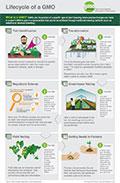Question
Answer
Expert response from Gilbert Arap Bor
Farmer, Kenya
Thursday, 10/01/2015 15:49
In Tanzania, researchers have figured out how to improve the cassava through biotechnology—a development that everyone ought to celebrate and promote.
This progress comes at a good time because the cassava brown-streak virus has become the leading threat to food security in many parts of East Africa. One study says that the disease can slash a farm’s productivity by as much as 70 percent. When it strikes, many smallholder farmers simply abandon their fields—and each time that happens, Africa’s dire food problems grow a little bit worse.
Biotechnology offers a potential solution. Scientists have learned how to trigger the cassava’s immune-defense system, allowing the plant to fend off the lethal brown-streak virus. These miracle plants are currently in field trials in Tanzania. If the field trials go well, farmers and consumers across the region will benefit. In East Africa, this means many smallholder farmers will experience enhanced cassava production, and hence food security and incomes.
Yet that will happen only if politics doesn’t get in the way of science. In Africa, unfortunately, politics always seems to intrude. Too often, we turn over our public policies to special-interest groups that despise biotechnology for reasons of ideology.
The result is a tragedy for Africa. Our continent routinely fails to feed itself.
In the United States and elsewhere, GM crops have produced an enormous bounty. This year, corn farmers in the Midwest are shattering all-time yield records, in large part because they can grow the best crops science can offer.
From the eyes of this African farmer, though, every year is a pretty good year for American growers. I wish we could enjoy similar levels of success.
The difference is technology. Americans have embraced it—and now they’re growing more food than ever before. In Africa, our governments have resisted GM crops—and we continue to suffer from hunger and malnourishment.
Forty-seven countries occupy the continent of Africa, but only four—Burkina Faso, Egypt, South Africa, and Sudan—have permitted the commercialization of GM crops. The rest of us must rely on farm technologies from the last century, even as we confront the 21st-century problems of climate change, environmental sustainability, and rapid population growth.
The cassava would be an excellent way to introduce more biotechnology into Africa. Most of its production goes straight into human bellies, feeding people directly. It’s also an essential famine-reserve crop. When other staples struggle or fail due to disease or drought, many Africans turn to the cassava for basic sustenance.
So a cassava plant that fends off the deadly brown-streak disease would be a blessing—and not just for the people who depend on this particular plant. Its commercial introduction could pave the way for Africa to accept more technology, especially in neighboring countries. Right now, goods and services, including crops, move with relative ease across our borders.
